The Scholars@Hallwalls Lecture Series Features New Research from the 2017-18 Faculty Fellows
Hallwalls Contemporary Arts Center, a space for experimental art, music, and film located in the heart of Buffalo at Delaware and Tupper, is the perfect setting for a seventh year of the Humanities Institute’s Scholars@Hallwalls lecture series. These monthly presentations feature one fellow’s research in an engaging lecture with lively follow-up conversation. This year’s lineup highlights the interdisciplinary range of humanities research at UB.
Talks are on Friday afternoons at 4 pm and are free and open to the public. Complimentary wine and hors d’oeuvres are served. Please join us for any or all of the Scholars@Hallwalls talks!
Hallwalls Contemporary Arts Center
341 Delaware Avenue
Map
“In the Specter of Desire: Art, Sex, and Politics under Yugoslav Socialism”
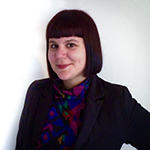 September 15
September 15
Jasmina Tumbas (Assistant Professor, Art)
The last two decades of Yugoslav socialism produced some of the most politicized and radical artistic experimentation in the Balkan region, which situated questions of sexuality, art, and power within the artist’s body and probed its relationship to the authority of the state. Focusing on Yugoslav artists’ embrace of taboo desires, Tumbas argues that these artists’ emphases on sexuality were predicated on a particular politicization under Yugoslavia’s unique brand of socialism, offering insights into the long-standing conundrum: just what was it that made Marshal Tito’s Yugoslavia so different, so appealing?
“Translating the Stage: Digital Theatricality in Live Broadcast Theatre”
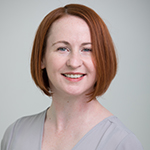 October 13
October 13
Lindsay Brandon Hunter (Assistant Professor, Theatre & Dance)
Professor Brandon Hunter’s talk considers the process by which stage performances are rendered into digital video (as in the National Theatre’s popular NT Live series), examining the potential of such products to translate theatre for a multifarious screen audience. Exploring how such translations act didactically to reify, conserve, or even construct notions of theatricality, Professor Brandon Hunter contends that they are inevitably grounded in a more fundamental making-clear of theatre itself, presenting not just a screened rendition of a staged original, but a subjective declaration of what constitutes theatricality and where theatre inheres.
“The Variegated Spread of Real-Time Crime Centers”
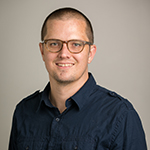 November 3
November 3
Nicholas Lustig (Assistant Professor, Geography)
Professor Lustig examines the origins of the recently constructed mass-surveillance centers in urban police departments. These centers are multimillion-dollar intelligence hubs intended to overhaul information infrastructures and expand surveillance capabilities. Lustig’s talk discusses the early programs in New York City and Baltimore, analyzes the varied pathways of diffusion of these centers, examines the most frequent criticisms of them (including privacy violations, targeting political activists, and mission creep), narrates a successful opposition to one in Oakland, and offers speculations about the future of these surveillance programs.
“The Paradox of Unpaid Labor in the US: Radical Creativity vs. Social Security”
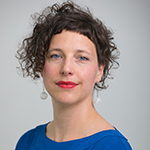 December 1
December 1
Katja Praznik (Assistant Professor, Arts Management)
Professor Praznik will discuss the variegated forms of the paradox of unpaid artistic labor, which she defines as the contradiction between the prestige and perceived exceptionality of artistic work and the injustice of the precarious, often unpaid labor that sustains it. She examines specific historical regulation of artistic work in the United States and compares its consequent deconstruction after the WWII with the transformations of artistic labor in socialist contexts to demonstrate the undermining effects of neoliberalism on artistic labor and the rising resistance of art workers against these forces.
“Capitalism, Globalization and Fascism”
February 9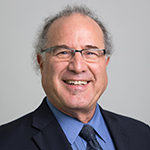
Richard Cohen (Professor, Jewish Thought)
Capitalism is not merely an economic system but represents also a devaluation of all values, with money, a means, serving as the only “value.” As such capitalism destroys all alternative value, undermining the dignity and solidarity of persons. In view of such capitalist nihilism, fascism promises to restore lost values, but in fact serves only as a violent cover for the ruling class of billionaires and multi-millionaires. The fascist regimes of early and mid-twentieth century in Italy, Germany and Spain, as well as more recent neo-fascist movements will be considered.
“Healthy Skepticism vs. Denialism: How to Tell the Difference”
March 2
James Beebe (Professor, Philosophy)
Philosophy professor James Beebe will draw upon insights from skeptical traditions in both the ancient and the modern worlds in an effort to understand what distinguishes healthy, constructive doubt from crude denialism. He will consider the role that humanistic disciplines can play in helping citizens in a post-truth political climate to recognize and communicate sources of reliable and unreliable testimony, legitimate and illegitimate reasons for doubt, and how to balance often conflicting expert advice.
“Ex machina: The Tragedy in the Machine”
April 13
Amy Graves Monroe (Associate Professor, Romance Languages & Literatures)
Professor Monroe’s talk argues for a deep connection between the rise of Pascalian probability, the interest in automata, the use of theater machines, and Aristotelian ideas of dramatic verisimilitude (i.e., likelihood) and catastrophe. As an interpretation of Aristotle, the Classical unities of time, place and action seek to formalize the circumstances of a happening on the stage. Drama becomes a forum for performing cause and effect, probing probability, exploring plausible outcomes, and wondering about the nature fate, chance, and necessity. The early modern play is a meditation on what constitutes an event.
“Growing up Modern”
May 4
Julia Jamrozik (Assistant Professor, Architecture)
Julia Jamrozik will discuss the research project “Growing up Modern” which she began with Coryn Kempster in 2014. Through original interviews and photographs the project documents the memories and retrospections of children who grew up in some of the most iconic buildings of the early 20th century, such as the Tugendhat Villa in Brno or the Haus Schminke in Loebau. By speaking with the serendipitous inhabitants of architectural visions and documenting their dwellings through the lens of these recollections, the research presents the buildings from a point of view, that of the user, that is not common in architectural history.
Save
